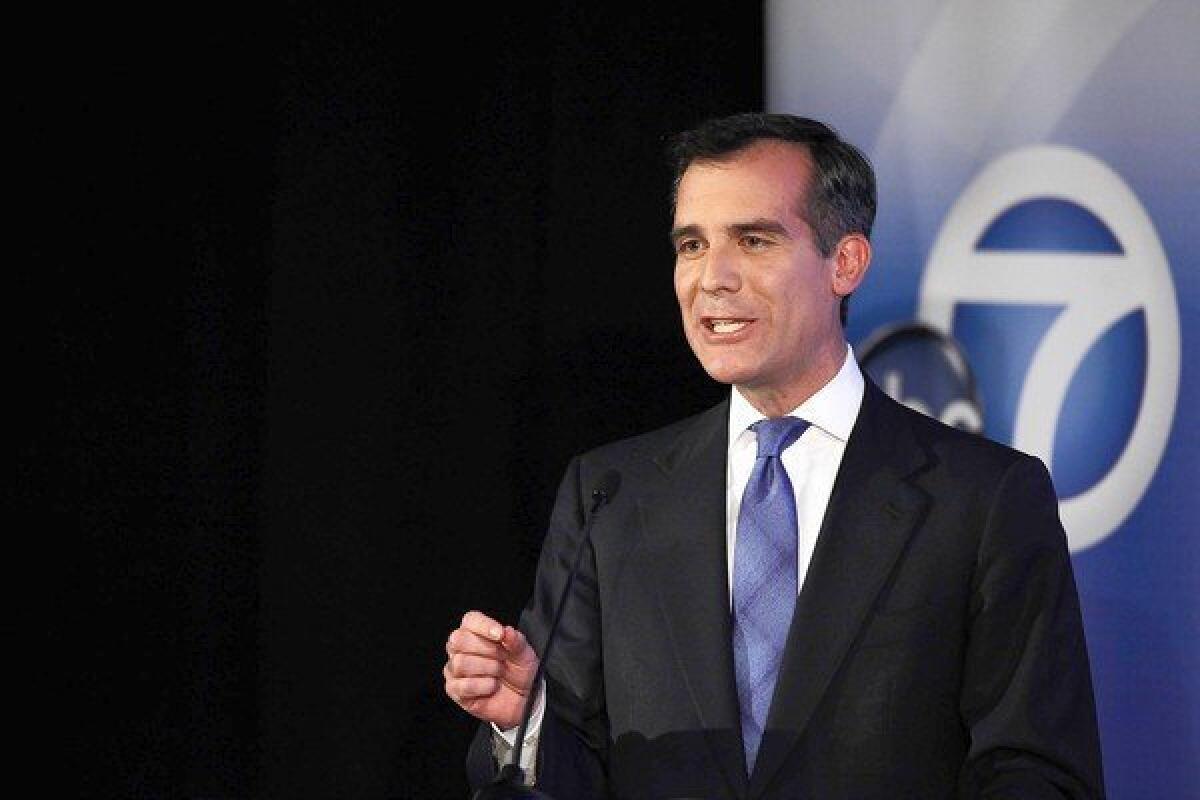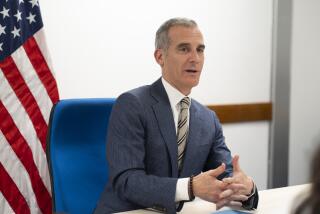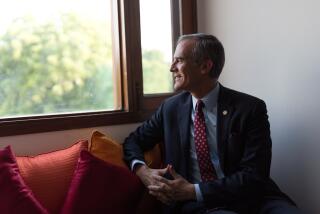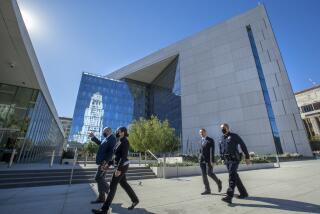Eric Garcetti showed political savvy during busy student years

- Share via
Fourth in a series of articles focusing on key periods in the lives of the mayoral hopefuls.
Ben Jealous still recalls walking into a Columbia University meeting of a new group called Black Men for Anita Hill and seeing a half-Jewish, half-Mexican kid from Los Angeles leading the discussion.
“What’s he doing here?” he asked the professor who organized the meeting.
“Honestly brother,” the teacher replied, “he’s the only one here I’m certain will really work hard.”
L.A. ELECTIONS 2013: Sign up for our email newsletter
It was Jealous’ first exposure to Eric Garcetti, a committed young progressive known on campus for gliding between different worlds and liberal causes. As a political science major at Columbia, Garcetti patched plaster and painted walls in low-income apartments in Harlem while also serving as the president of an exclusive literary society known for its wealthy membership. He led a men’s discussion group on gender and sexuality, ran successfully for student government, and wrote and performed in musicals.
His busy student years offered hints of the future political persona that would later help him win a Los Angeles City Council seat and emerge as a leading candidate for mayor. As he pursued countless progressive causes — improved race relations in New York City, democracy in Burma and human rights in Ethiopia — Garcetti also exhibited a careful stewardship of his image and a desire to get along with everyone.
Some of his critics complain that he is confrontation averse, and say his chameleon-like abilities are political. Others complain that he has lost touch with his activist roots, citing his recent advocacy for a plan to allow taller and bigger buildings in Hollywood despite strong opposition from some community members.
FULL COVERAGE: L.A.’s race for mayor
But Jealous, who went on to study with Garcetti at Oxford, where they were both Rhodes scholars, remembers his classmate as “authentically committed” to social justice and naturally at ease in different settings. That was a valuable trait in early 1990s New York City, when tensions between whites and blacks were high, said Jealous, who is now the president of the National Assn. for the Advancement of Colored People. Against a backdrop of racial violence, including the stabbing of the Rev. Al Sharpton in Brooklyn in 1991, “there was an urgent need to build bridges,” he said.
On Columbia’s campus, Garcetti pushed to involve more men in Take Back the Night protests against sexual violence and tracked hate crimes as president of the National Student Coalition Against Harassment. He also worked against homelessness and founded the Columbia Urban Experience, a program that exposes incoming freshmen to city life through volunteerism.
Judith Russell, a Columbia professor who taught Garcetti in a yearlong urban politics course, remembers him as a skilled organizer. “Eric was one of the best people I’ve ever met at getting people to agree,” she said.
He was also ambitious. Russell says she wrote countless recommendation letters for Garcetti, who was always applying for some new opportunity. “For most people I have a file or two. For Eric I have a folder,” she said.
Even as a student, Garcetti went to great lengths to guard his image and public reputation. In a 1991 letter to a campus newspaper, a 20-year-old Garcetti sought a retraction of a quote that he acknowledged was accurate. A reporter wrote that Garcetti called owners of a store that declined to participate in a Columbia-sponsored can recycling program “assholes.” Garcetti said the comment was off the record.
“I would ask, then, if you would retract the quote, not because of the morality of my position, rather the ethics of the quoting,” he wrote.
That self-awareness came partly from being raised in a politically active family. Back in Los Angeles, his father was mounting a successful campaign for county district attorney. His mother, the daughter of a wealthy clothier, ran a community foundation. Her father, who had been President Lyndon B. Johnson’s tailor, made headlines in the 1960s when he took out a full-page ad in the New York Times calling on Johnson to exit the Vietnam War.
Garcetti’s family wealth allowed him to carry on the legacy of political activism. While attending L.A.’s exclusive Harvard School for Boys, he traveled to Ethiopia to deliver medical supplies. In college, while other students worked at summer jobs, he traveled twice to Burma to teach democracy to leaders of the resistance movement.
In 1993, after receiving a master’s degree from Columbia’s School of International and Public Affairs, Garcetti departed for Oxford. There he met Cory Booker, a fellow Rhodes scholar who is now the mayor of Newark, N.J., and a likely candidate for the U.S. Senate. Garcetti, Booker said, “was one of those guys who would be in the pub at midnight talking passionately about making a better world.”
In England, Garcetti worked with Amnesty International and also met his future wife, Amy Wakeland, another Rhodes scholar with activist leanings. Garcetti remembers being impressed when Wakeland missed President Clinton’s visit to the Rhodes House at Oxford because she was on the streets protesting tuition hikes. Her worldview aligned with his, he told friends.
In his second year at Oxford, Garcetti persuaded student leaders to join him in a hunger strike after the passage of Proposition 187, the 1994 California ballot measure that denied immigrants access to state healthcare and schools.
Looking back, he sees the hunger strike as a bit of youthful folly. “We were young,” Garcetti said. “Was a fast an ocean away going to overturn 187? No. But in my book, whether it’s me in Los Angeles seeing an injustice across an ocean or vice versa, you have to stand up and be heard.”
Garcetti so wanted to be heard that he called a Los Angeles Times columnist to alert him to the protest. It was a savvy media move by someone who would be running for City Council only seven years later.
Back in Los Angeles, after studying at the London School of Economics, Garcetti and Wakeland dived into progressive politics. He taught human rights and political science at USC and Occidental College. Wakeland worked for the Progressive Los Angeles Network, formed to influence the 2001 mayor’s race. She later joined the board of the Los Angeles Alliance for the New Economy, a labor-friendly advocacy and research group that is pushing, among other initiatives, a controversial plan to create a new system of exclusive franchises for commercial waste hauling in the city.
Garcetti won his council seat in 2001 with strong backing from liberals and progressives. He says he has continued to emphasize activism, citing a program he created that trains constituents to become engaged in local government.
But activist Doug Haines is one of a contingent of activists in Garcetti’s district who complain that he doesn’t listen to community members and is too cozy with developers. Haines cited a new Target store and retail complex planned for Sunset Boulevard and Western Avenue, as well as the Hollywood Community Plan, which allows more building in the heart of Hollywood.
“He’s a kid who grew up with a spoon in his mouth, a very golden spoon,” Haines said. “He doesn’t give a hoot what anybody cares about in the community.”
Larry Gross, an affordable housing activist, gives Garcetti credit for being a council leader in fighting foreclosures. But he said he and others were disappointed when Garcetti voted to kill a 2010 measure that would have frozen rent increases.
“There’s a mixed record there,” said Gross, executive director of the Coalition for Economic Survival.
Young idealists often have to adjust their views when they win elective office, Gross added. “Not many remain totally pure to their activist roots,” he said. “Now they represent everyone.”
Garcetti said he listens to community input, but not everyone gets what they want in the political process. “I love when I can get consensus, but there are times when you can’t get it,” he said.
Still, Garcetti insists that his years as a politician haven’t compromised his core beliefs. “You do this job right, you become more of an idealist,” he said.
More to Read
Sign up for Essential California
The most important California stories and recommendations in your inbox every morning.
You may occasionally receive promotional content from the Los Angeles Times.











